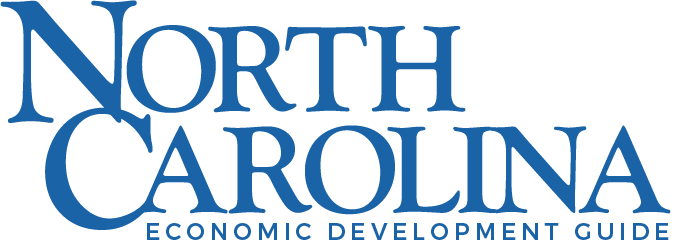Resource rich
Though North Carolina consistently lands at or near the top of national business-climate rankings, the state isn’t resting on its laurels. Two years ago, the state created a public-private partnership to tackle job-recruitment, tourism-promotion, international-trade and other efforts previously handled by the state Commerce department. While several high-profile projects and events have bypassed the state due to the controversial public-accommodations law commonly known as House Bill 2, the Economic Development Partnership of North Carolina remains steadfast in its efforts to recruit business. The group is led by Christopher Chung, who came to the Cary-based organization in 2015 after helping launch a similar effort in Missouri. The nonprofit EDPNC enables the state to tap into additional private resources, allowing it to be more aggressive and wide-reaching in its efforts to connect with companies looking to move or expand here, Chung says. He explains how the partnership works with businesses in carrying out its five core functions: recruiting new companies, taking care of existing employers, promoting North Carolina exports, promoting the state for travel and tourism, and providing counseling for small businesses and startups. Comments were edited for brevity and clarity.
HOW HAS THE PUBLIC-PRIVATE PARTNERSHIP IMPROVED BUSINESS-RECRUITMENT EFFORTS ?
It’s given us access to even more resources, primarily financial, to broaden and strengthen the reach of the organization’s marketing message of “why North Carolina?” The two biggest audiences that we try to reach, business and tourism, are both critical to economic development in this state. The more successful we are in getting those audiences to put their investment here in North Carolina, that’s ultimately something that helps the entire state’s prosperity.
Unlike a state agency, as a nonprofit we are able to raise dollars from private-sector companies that also would benefit if North Carolina’s economy is firing on all cylinders. So it’s no surprise that a lot of our private-sector investors are power companies, construction firms, real-estate firms, banks — those are all industries that see benefits to their bottom line if North Carolina’s economy is performing at a very high level.
HOW DOES THE EDPNC HELP COMPANIES FIND THE RIGHT LOCATION WITHIN THE STATE?
Some companies come with a preconceived notion of where they want to be, or where they think they need to be. Some have done a lot of desktop data analysis prior to even picking up the phone, looking at workforce-availability models, utility-cost models, availability of suitable real estate, etc.
Others come with ideas based on familiarity: Charlotte, Raleigh, Durham are places they’ve heard of and that’s where they want to look. If a company comes in and says ‘this is the only area we are focused on,’ and it’s very clear why, we’re not going to push them elsewhere.
With other companies, based on their parameters, the entire state could be in play. Any time we have the ability to influence where the company is looking, it’s our responsibility to broaden that playing field as much as possible because that puts more options in the mix for North Carolina. As a state organization, anywhere is a win for the state.
WHAT SUPPORT IS AVAILABLE FOR EXISTING BUSINESSES OR COMPANIES NEW TO THE STATE?
It’s incumbent on us to take care of all companies, whether they’ve been here for a day or 50 years. We have one representative for each of eight regional prosperity zones who spend their workdays calling on existing employers, usually in partnership with local economic developers. They walk through issues that may be holding those companies back from growing further here in North Carolina, and discuss available opportunities for those companies to expand in the state. And if so, what resources could help accelerate the timetable for that expansion?
Sometimes, it’s a workforce-development issue. Maybe they don’t feel like they have the resources to hire and train a workforce, so we’ll connect them with some of the resources that can help them do that. Other times, it’s a regulatory challenge, maybe a permit that they need but haven’t been able to get, and we’ll help them navigate that process. Sometimes it’s a transportation issue — maybe to facilitate an expansion, they need a new turn lane added on their access road. Or it may be just offering resources to help with things like lean management and greater efficiency in the workplace.
Fundamentally, their toolbox is essentially any and all state, regional or private-sector resources that can help assist with a company’s growth. They have a whole Swiss Army knife of resources that they can pick and choose based on whatever particular issue a company is facing. The end goal is to not only get those companies to keep their doors open here, but also facilitate future growth or expansion.
HOW DOES THE PARTNERSHIP HELP MANUFACTURERS?
A key function of the EDPNC is export assistance. Some companies have products that are selling very well here in North Carolina or in the United States, and they may be looking to expand into Canada or Mexico, oftentimes further afield. Our goal is to help these companies figure out whether, where and how they can enter new markets overseas. These are small or midsized companies that don’t have a global sales team or global distribution network — smaller firms that are selling a pallet-load today but want to expand that to a container-full down the road. If those companies are successful selling more of their goods overseas, that money is by and large going to flow back to the companies here, and it’s money they can invest in further expanding their operations.
MILLENNIALS RECENTLY SURPASSED BABY BOOMERS AS AMERICA’S LARGEST GENERATION. HOW IS NORTH CAROLINA POSITIONING ITSELF AS A PLACE YOUNGER GENERATIONS WANT TO WORK AND LIVE?
A lot of places are trying to figure out how to attract their fair share of this population, because there’s some credence to the idea that employers will follow the workforce rather than the workforce following the employers. I think the effort to build a place that’s attractive to this generation tends to be led more by people in metro areas or at the county level. Charlotte’s had a lot of great success building out the LYNX light rail line, and the new extension from downtown up to UNC Charlotte’s campus (expected to open in fall 2017) is a great example of that.
North Carolina is very fortunate to have both beaches and mountains, which are in close proximity to our metro areas. That alone is enough to compel people to put North Carolina on the list of places they’d like to move. There’s no silver bullet to how you attract millennials, but North Carolina is still a relatively affordable environment. Taxes, housing and energy costs are all considerably at or below the national average. We’ve got a lot of things naturally flowing to our advantage.
HOW IMPORTANT IS INTERNATIONAL INVESTMENT?
It’s very important. Historically, when you look at the number of business-recruitment projects and expansion deals that we are competing for, about a third are foreign-owned companies. Europe, Canada, Asia are probably the three largest markets. We are increasingly seeing deals flow from India, Turkey and China.
We’ve really tried to beef up our foreign direct investment attraction efforts, focusing on the businesses that are looking to set up operations here in the U.S. We’ve tried to strengthen that approach in hopes it will lead to more deals that North Carolina can compete for and ultimately win.
DO INCENTIVES MATTER?
In 90% of the cases where we are competing with other states to attract a particular employer or to convince an existing employer to grow, incentives are part of the conversation. For some companies, absolutely, it’s going to break the tie between North Carolina and another location. For other companies, it may be somewhat less important. You still have to have a strong business case in all the other areas that a company is evaluating, such as the overall cost of business from tax, energy and real-estate perspectives. You still have to have an available workforce and institutions that can crank out that future workforce, such as two- and four-year colleges, K-12 schools, etc. You still have to have good infrastructure and locational access to whichever markets a company is trying to serve. All of these things are going to be weighed in different proportions by each individual company. But incentives are not the only thing.
EXPLAIN THE IMPORTANCE OF NORTH CAROLINA’S MILITARY POPULATION.
We’ve got about 17,000 members of the armed services leaving the military each year, re-entering civilian life and the private-sector workforce. A lot of these individuals bring a wealth of real skills and an indisputable work ethic to any employer lucky enough to have them. The question is, how do you help an employer translate what someone did in the armed services into something that’s analogous in the private sector? For example, if you’re in artillery command, what does that actually translate to in terms of a skill set that a private-sector employer can appreciate?
There’s been a lot of progress here in North Carolina in updating job-search databases. If you’re active-duty military, you put in your qualifications, and the job-search platforms can essentially translate what your skill set means in the armed services versus what it would parallel in the private sector. The North Carolina For Military Employment initiative, which helps connect military talent with jobs and education opportunities, was launched in the middle of 2015. Having access to these men and women leaving
the armed services is another pipeline of really high-quality talent that can help our employers be that much more productive.
HOW IS THE STATE FARING, IN TERMS OF ECONOMIC DEVELOPMENT?
We’re having a strong year in terms of activity and companies that are looking here and considering North Carolina. I think we benefit from doing very well in business-climate rankings that come out each year, including CNBC, Forbes and CEO Magazine. That gets us on a lot of short lists to be considered by companies when they are growing. But that’s no excuse for us not being proactive and intentional when we go out there and target other opportunities to recruit more companies.

